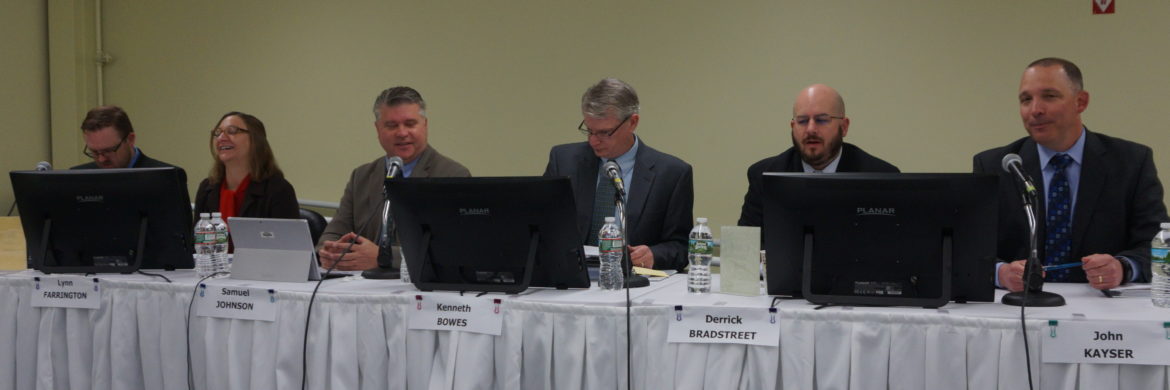May 31: Day 10 Northern Pass adjudicative hearings resume before the state Site Evaluation Committee.
By GARRY RAYNO,
InDepthNH.org
CONCORD — Construction of the Northern Pass Transmission line will significantly impact North Country residents’ way of life, intervenors told company officials on Wednesday.
Adjudicative hearings before the Site Evaluation Committee resumed after nearly a month break on the $1.6 billon high-voltage, 1,090 megawatt, 192-mile transmission line between the Canadian border and Deerfield, where it would hook into the New England electric grid.
The hearings resumed with project developer Eversource’s construction panel, which had already given three days of testimony and is not expected to finish until Thursday.
“No to Northern Pass” signs lined the street leading to the building where the hearings are held in Concord while inside intervenors —most opposed to the project — prepared to question the construction panel.
The buried, 60-mile portion of the line continues to be a concern for abutters along the route from the White Mountain National Forest to Bridgewater.
Carl Lakes of Easton noted the horizontal drilling to place the transmission line under water bodies, wetlands or highways could cause a “frac-out” or blow-out that could pollute the water.
Would equipment be available to immediately respond if a frac-out occurred, he asked, and Eversource Vice President of Engineering Kenneth Bowes said each location would have a specific plan depending on the site. Some sites may need boats, he noted.
“So there could be a significant blow-out and the equipment may not be there if you determine it is not needed,” Lakes said, but Bowes said that is not what he said.
He said such drilling is done routinely for many projects.
Lakes also was concerned about the cement splice vaults that will be about every one-third of a mile along the buried section of the line. Once the line is complete they will be covered and restored with access through a man-hole.
The vaults will be under some of the roads the line would follow but also in the road right-of-way and in some cases under private property if an easement is granted.
Lakes characterized the vaults as having “a house buried in your front yard.”
He noted people in Connecticut were paid when the vaults were buried in their property for the transmission line upgrade between Middleton and Norwalk.
Bowes said that is true when the vault was outside of the road right-of-way and said the company would be willing to do the same, but noted some communities like Franconia have not responded to the company’s outreach in 18 months.
Lakes noted the construction would last over two construction seasons. “That is a long time for construction in residential areas,” he said.
In the North Country people are used to hearing birds singing and water flowing, Lakes said. “That is why people live there.”
He noted most people’s air conditioning is to open the windows and while construction is ongoing, they will hear generators running, dump trucks, cement trucks running up and down the road, excavators and road pavement being dug up.
“Do you understand how that could be offensive to local residents for an extended period of time?” Lakes said.
Bowes said the work would be normal construction activity. “I agree there will be impacts as they are for general road construction,” he said, but added they are willing to include work hours and special considerations in agreements with towns but said some have not responded for 18 months.
Several other intervenors were concerned about the line’s effect on the natural gas pipeline that shares the right-of-way in several areas.
They were concerned the high-voltage lines would hasten corrosion of the pipeline and could cause the metal to become “electrified,” possibly shocking someone who might inadvertently touch it.
But project officials said the new line is designed to prevent such a scenario and a properly maintained pipeline would not be adversely impacted.
The adjudicative hearings are scheduled for the rest of the week with Julia Frayer of the London Economics International LLC scheduled as the next witness. Frayer produced a report on the project’s cost-benefit and local impact for Eversource.
The Site Evaluation Committee is expected to make a final decision in September and Eversource officials said it will take between two and three years to construct the project.
The adjudicate hearings are expected to continue into August.
Garry Rayno can be reached at garry.rayno@yahoo.com.
InDepthNH.org’s recent coverage of the Northern Pass hearings. For older stories, see our comprehensive coverage on our Northern Pass page.
April 13, Day 1: Eversource NH Chief Quinlan On The Hot Seat At Northern Pass Hearing
April 14, Day 2: Eversource Chief Questioned About ‘Clean’ Energy Claims And Northern Pass Costs
April 17: Day 3: Eversource: Hydro-Quebec Revenues Could Fall Short In Northern Pass’ First Year
April 18: Day 4: Northern Pass’ Potential Health Concerns Debated At Hearing
April 19: Day 5: Concerns Raised About Northern Pass Affecting Health of Sherburne Woods Residents in Deerfield
April 30: Is NH Getting ‘Hoodwinked’ on Health and Safety By Northern Pass?
May 1: Day 6: Testimony: 44 New Access Roads Needed To Build 192-Mile Northern Pass in NH
May 2: Day 7: Northern Pass Expert: 3 Months of Construction Likely In Downtown Plymouth
May 3: Day 8: Project Official: Northern Pass Construction Limited To 7 am to 7 pm, Noise Assessed Daily
May 3: Eversource’s Chief Quinlan Listed as ‘Host’ For Sununu Fundraiser
May 4: Day 9: Grafton County Attorney Grills Northern Pass Experts On Land Buys
May 5: Day 9, story 2: Common Man’s Alex Ray: Northern Pass Disruption in Plymouth Would Be ‘Fatal’ To Business
Forest Society Calls Northern Pass Inflated Land Buys a ‘Shell Game’
Contact: nwest@indepthnh.org, 603-738-5635





